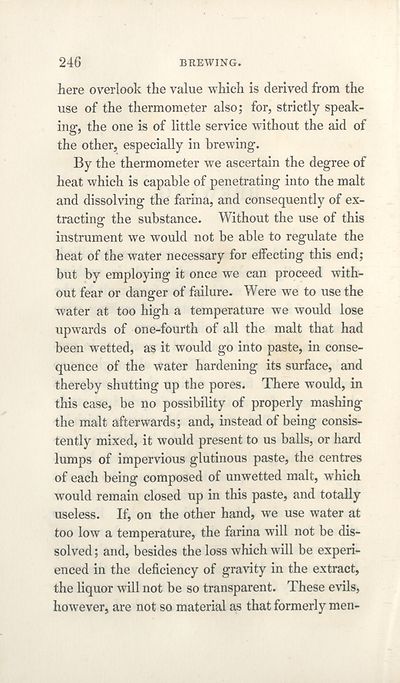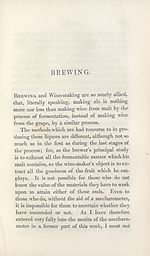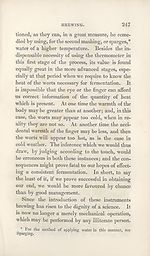Download files
Complete book:
Individual page:
Thumbnail gallery: Grid view | List view

246
BREWING.
here overlook the value which is derived from the
use of the thermometer also; for, strictly speak¬
ing, the one is of little service without the aid of
the other, especially in brewing.
By the thermometer we ascertain the degree of
heat which is capable of penetrating into the malt
and dissolving the farina, and consequently of ex¬
tracting the substance. Without the use of this
instrument we would not be able to regulate the
heat of the water necessary for effecting this end;
but by employing it once we can proceed with¬
out fear or danger of failure. Were we to use the
water at too high a temperature we would lose
upwards of one-fourth of all the malt that had
been wetted, as it would go into paste, in conse¬
quence of the water hardening its surface, and
thereby shutting up the pores. There would, in
this case, be no possibility of properly mashing
the malt afterwards; and, instead of being consis¬
tently mixed, it would present to us balls, or hard
lumps of impervious glutinous paste, the centres
of each being composed of unwetted malt, which
would remain closed up in this paste, and totally
useless. If, on the other hand, we use water at
too low a temperature, the farina will not be dis¬
solved ; and, besides the loss which will be experi¬
enced in the deficiency of gravity in the extract,
the liquor will not be so transparent. These evils,
however, are not so material as that formerly men-
BREWING.
here overlook the value which is derived from the
use of the thermometer also; for, strictly speak¬
ing, the one is of little service without the aid of
the other, especially in brewing.
By the thermometer we ascertain the degree of
heat which is capable of penetrating into the malt
and dissolving the farina, and consequently of ex¬
tracting the substance. Without the use of this
instrument we would not be able to regulate the
heat of the water necessary for effecting this end;
but by employing it once we can proceed with¬
out fear or danger of failure. Were we to use the
water at too high a temperature we would lose
upwards of one-fourth of all the malt that had
been wetted, as it would go into paste, in conse¬
quence of the water hardening its surface, and
thereby shutting up the pores. There would, in
this case, be no possibility of properly mashing
the malt afterwards; and, instead of being consis¬
tently mixed, it would present to us balls, or hard
lumps of impervious glutinous paste, the centres
of each being composed of unwetted malt, which
would remain closed up in this paste, and totally
useless. If, on the other hand, we use water at
too low a temperature, the farina will not be dis¬
solved ; and, besides the loss which will be experi¬
enced in the deficiency of gravity in the extract,
the liquor will not be so transparent. These evils,
however, are not so material as that formerly men-
Set display mode to:
![]() Universal Viewer |
Universal Viewer | ![]() Mirador |
Large image | Transcription
Mirador |
Large image | Transcription
| Antiquarian books of Scotland > Occupations > British wine-maker, and domestic brewer > (284) |
|---|
| Permanent URL | https://digital.nls.uk/126003329 |
|---|
| Description | Thousands of printed books from the Antiquarian Books of Scotland collection which dates from 1641 to the 1980s. The collection consists of 14,800 books which were published in Scotland or have a Scottish connection, e.g. through the author, printer or owner. Subjects covered include sport, education, diseases, adventure, occupations, Jacobites, politics and religion. Among the 29 languages represented are English, Gaelic, Italian, French, Russian and Swedish. |
|---|

